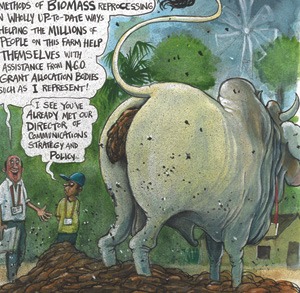The first response that springs to mind when someone attempts to tell you how to 'think like a philosopher' is probably 'why on earth would I want to?' Second only to mad scientists in the league of deranged, if occasionally endearing, human beings, behaving like a philosopher doesn't, generally, have much to recommend it. From Empedocles' leap into a volcano to Bacon's contracting pneumonia after trying to stuff a chicken with snow in an early attempt to research refrigeration, not to mention Socrates' poisoning at the hands of the state and Descartes' untimely demise due to having to get up early to teach Queen Christina of Sweden, it's clear you'd have to be a pretty feckless individual indeed to want to actually 'be' a philosopher. Can we instead extract certain philosophical ideas for our own, perhaps more human, purposes, without going the whole hog? Nicholas Fearn certainly thinks so: rather than their "theories and systems", he argues, the most enduring contributions of philosophers are "the thinking tools, methods and approaches they invent or discover".
Whether one agrees with Fearn's premise (I, for one, would dispute that it would be possible to simply extract Hegel's method from his system, or easily transfer the implications of Turing's 'machine' to other areas of investigation), it is, nevertheless, a potentially engaging conceit: power tools for mind DIY. To this end, Fearn rather cutely divides the book into 25 brief chapters, pairing each philosopher to his particular 'implement'. Thus we have 'Ockham's Razor', 'Hume's Fork', 'Rousseau's Contract', and so on. (Far be it for me to suggest Fearn misses a trick by not including 'Socrates's Cock' – the animal famously promised to Aesculapius on his death-bed.)
Oddly, Fearn doesn't really provide an answer to the broader 'why' question here, perhaps believing that the methods he outlines will be enough to convince the reader of philosophy's overall usefulness. If, as he argues, "too much philosophy is commonly thought to make one miserable", the reader might well be satisfied that just pilfering bits here and there in order to beef up one's reasoning might not be such a bad idea. Unfortunately, Fearn makes a very lopsided case for the utility of many of the 'tools' on display here. Hegel's 'dialectic' becomes a young soldier's realisation that behaving somewhere between cowardice and rashness is probably for the best; Bentham's 'calculus' becomes a hypothetical jury at the OJ Simpson trial contemplating a 'not guilty' verdict even in the face of overwhelming evidence, because a group of 'armed fanatics' ("and this does not mean the LAPD", he adds, darkly) might cause mayhem in LA. This unfortunate tendency to mingle moral, political and theoretical examples leads to conceptual confusion as well as some deeply problematic turns of phrase. From the standpoint of Dawkins' 'meme', for example, Fearn suggests that the anti-Semitic tradition in Europe that contributed to the Holocaust was 'futile', as it ultimately destroyed its own means of propagation because its foremost proponents were killed by the end of the World War II. One can think of many descriptions of genocide and those that instigate it, but 'futile' is not one that tends to go down particularly well among many people, even philosophers.
The frequently light-hearted tone in which Fearn discusses extremely serious moral and political examples does not go very far in persuading the reader that philosophy might be useful in helping to work through such cases. Casual generalisations such as "Rousseau's egalitarian ethical views helped lead to the totalitarian horrors of Nazism and Stalinism" (how? In what way in each case?), not to mention incorrect banalities such as "the three stages of [Hegel's] dialectic are: thesis, antithesis and synthesis," (a vulgarisation taken from Fichte and popularised in the 20th century by anti-Hegelians such as Popper), are likely to deeply mislead the casual reader, and aggravate the slightly better-informed.
Whilst some of the biographical detail is mildly diverting (Bentham's struggle to get his Panopticon built; Wittgenstein's unsuccessful application for Soviet citizenship), there's little material here not available in philosophical dictionaries, more sustained short introductions or better-researched biographies. While each bite-sized chapter might appeal in principle ('Kant in my coffee break!'), Fearn's accounts are often patchy, muddled and under-argued. Far better, one might conclude, to go back to the pre-Socratics and start from the beginning; failing that, invest in a copy of Descartes' Meditations or Plato's Apology to see for yourself how philosophers really do think, rather than rely on Fearn's mealy and misleading offering.

